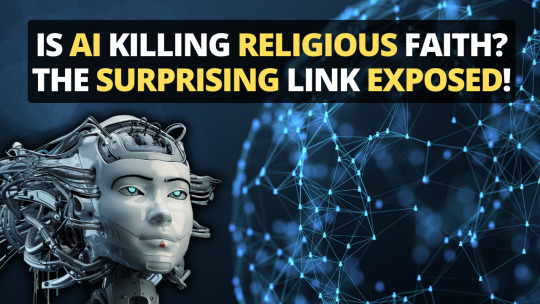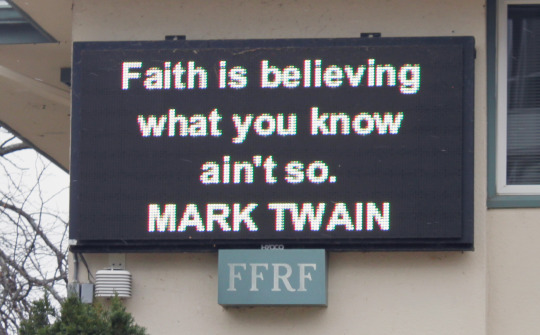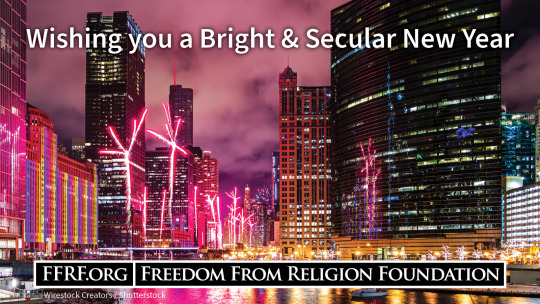#FFRF
Text

Religion has continuously declined worldwide in the 21st century, including in the United States. There are different ideas as to the factors that contribute to this decline. However, a recent paper suggests that automation in the form of artificial intelligence and robotics is a primary driver in the current downward trend of global religiosity.
In a recent paper, researchers argued that automation in the form of robotics and AI is the real driver of the recent trend. A series of experiments showed that exposure to automation at the national and local levels is linked to a reduction in religiosity.https://t.co/LklYwP0AyU
— FFRF (@FFRF) August 31, 2023
An international team of researchers recently published a paper titled “Exposure to Automation Explains Religious Declines” in the Proceedings of the National Academy of Sciences (PNAS). The report sought to explain the decline of religion amidst the technological advancements in the 21st century.
“When people can use technology to predict the weather, diagnose and treat illness, and manufacture resources, they may rely less on religious beliefs and practices,” the paper said.
Although technological advancement has been considered a primary factor in religion’s decline globally, religiosity hasn’t seen a massive drop during historical periods where technology significantly developed, notably the Industrial Revolution, the Space Race during the Cold War, and the rise of Personal Computers.
The researchers presented a hypothesis as to why religiosity only dropped massively as recently as the 21st century. It’s not technology itself that reduces religiosity, but automation, mainly in AI and robotics, two technological advancements that only became prominent in the 21st century.
“This claim is based on recent research on lay perceptions of automation. Such studies show that people ascribe automation technology with abilities that border on supernatural,” the researchers wrote.
“Historically, people have deferred to supernatural agents and religious professionals to solve instrumental problems beyond the scope of human ability. These problems may seem more solvable for people working and living in highly automated spaces,” they added.
The researchers conducted four experiments to test their hypothesis. The first tracked religious decline from 2006 to 2019 across 68 countries through a survey question with more than two million respondents, which said, “Is religion an important part of your daily life?”
They reported that exposure to robotics “was robustly and negatively associated with religiosity across the globe.” The correlation remains valid even after factors such as GDP per capita, telecom development, and energy development have been considered.
The second experiment examined the decline in religious belief in the United States, comparing religiosity rates and robotics growth in metropolitan areas from 2008 to 2016.
“Metropolitan areas with higher levels of robotics growth (+1 standard deviation) experienced an approximately 3% yearly decline in religion each decade,” the paper said.
For the third experiment, the researchers followed 46,680 individuals in a specific community from 2009 to 2020, measuring their self-reported belief in God and their job exposure to automation. They discovered that the religiosity of individuals who worked at jobs with higher exposure to AI and robotics significantly dropped over time.
“People with jobs that were one standard deviation higher than the mean on occupational exposure to AI were 45% less likely to believe in God compared to people in occupations that had a mean level of exposure to AI,” the paper said.
The last experiment was conducted at the most local level. The researchers followed 238 employees in an organization, directly measuring their exposure to AI and religious beliefs. They found that AI exposure was connected to a drop in religious belief.
While the study's results were correlative and do not necessarily imply causation, they strongly support the researchers’ hypothesis that automation leads to a drop in religiosity.
“Our studies demonstrate that automation is linked to religious decline across multiple religious traditions (e.g., Christian, Muslim, and Buddhist), world regions (e.g., North America, South Asia, and Oceania), and levels of analysis,” they noted.
==
Any sufficiently advanced technology is indistinguishable from gods.
#AI#artificial intelligence#Atheist Republic#rise of the nones#leaving religion#empty the pews#decline of religion#religion#FFRF#Freedom from Religion Foundation#religion is a mental illness
18 notes
·
View notes
Photo

https://twitter.com/FFRF/status/1572602241080754182
33 notes
·
View notes
Photo

Cruelly cropped out of this image are FFRF Co-President Annie Laurie Gaylor and Dan Barker (co-presidents of the Freedom From Religion Foundation).
Some religious people are so brainwashed that they think atheists are just waiting for a personal trauma seismic enough to jolt them into belief when in reality, the opposite is far more likely.
In any case, the delightful phrase, “there are no atheists in foxholes” is not designed to challenge atheists but to validate the worldview of religious people.
"It's not an argument against atheism - it's an argument against foxholes."
- James Morrow, Towing Jehovah
60 notes
·
View notes
Text
freedom FROM religion
youtube
#We don’t have to tolerate this crap#religious freedom#religious freedom isn’t just for evangelicals#keep your hands off the kids#first amendment#separation of church and state#theocracy#conservatives#sue the bastards#exvangelical#glad I escaped this crap#go ye into all the world and beat people over the head with the Bible#ffrf#ffrf victory#freedom from religion#Youtube
2 notes
·
View notes
Text

12 notes
·
View notes
Link
Hey folks, I wanted to let you all know that I found there's a school in Arkansas - which does not label itself as a christian school - that has been pushing christianity onto its students. I recommend reaching out to the Freedom From Religion Foundation and the ACLU about this. I also think it could be beneficial for this to be another potential location for TST's After-School Satan if the school will not back down on putting religion into an educational environment.
In addition to the link I shared here, here's another where they're having children read bibles in school.
https://www.facebook.com/permalink.php?story_fbid=pfbid02L9va1Tz7PkT2eM7dshYPpgofwrodqX7V1EZgvAuZDKKaiXUp42FVXJCjSY4ULHB6l&id=100063553270145
#indoctrination#seperation of church and state#child abuse#brainwashing#christianity#christians#bible#freedom from religion#Freedom from religion foundation#FFRF#ACLU#American Civil liberties union#TST#The Satanic Temple#Satanism#Satanist#Atheism#Atheist#religious freedom#After-School Satan
4 notes
·
View notes
Text
On Wednesday, atheist Joseph Richardson of the Central Florida Freethought Community was slated to deliver an invocation during a meeting of the Tavares City Council in Florida.
He gave an excellent speech, urging the commissioners to “unite in the spirit of reason, compassion, and the pursuit of justice.” He reminded everyone to make sure their actions were “guided by the principles of inclusivity, fairness, and respect for the autonomy of every individual.”
Perfectly fine. Completely non-offensive.
But then, immediately after Richardson was done, Phil Clark, the city’s utilities director, was invited to deliver a second invocation. A replacement invocation. A Christian invocation. Because, apparently, the secular one didn’t count.
Clark’s brief speech referenced “Heavenly Father” and asked God to “forgive us for our sins… in Jesus Christ’s name.”
Even more shocking? This isn’t the first time this has happened to Richardson. In fact, this is the fourth time a local government in Florida has felt the need to “correct” his supposed error. It’s previously happened in the city of Apopka (2015), the city of Eustis (2017), and Lake County (2022). A similar corrective measure occurred in the Arizona legislature in 2017 when a state legislator gave a secular invocation, only to see one of her colleagues request and receive permission to deliver a Christian one right after.
In 2019, after Richardson gave a secular invocation in the city of Ocoee, the mayor literally apologized afterwards, saying, “This is something that was brought to us to do, not that we do it.”
Atheist invocations don’t need a Jesus-infested “do-over.”
Maybe even more damning is the fact that Clark was ready to go with a pre-planned sermon even though the agenda for the meeting only listed a member of the Central Florida Freethought Community as giving the invocation.
This wasn’t an on-the-spot decision. This was decided in advance.
Now the Freedom From Religion Foundation is getting involved.
In a letter to the Tavares City Council, attorney Chris Line calls the council’s actions “discriminatory and unconstitutional.”
We write to ask that the Council immediately apologize to Joseph and ensure that the discriminatory conduct exhibited at the February 7 meeting does not recur. If the Board cannot treat invocation speakers equally, instead favoring Christianity and denigrating nonbelievers, the practice of having an invocation needs to be eliminated entirely.
FFRF is also requesting public records regarding this makeup invocation, including all communications between council members and Phil Clark.
David Williamson, co-founder of the CFFC, told me the treatment of Richardson shows a clear “pattern of discrimination.”
… Perhaps we shouldn't be surprised when we see more of it nearby. Our invocations are inclusive and appropriate to solemnize the occasion. To treat non-theists differently than others who provide an invocation is clearly discriminatory and we have already shown that we won't stand for it…
We intend to be at the next meeting to speak during public comment and express our great concerns for this practice and request an apology.
#religion#government#invocations#secular invocations#atheism#atheist news#cffc#ffrf#christian nationalism#phil clark#tavares#florida#joseph richardson#hemant mehta
0 notes
Text
also again i said this before, ink demon is not just who look like xenomorph but also look like the batman who laughs
#Pointy ears and a smile...#dc#batman who laughs#ink demon#batim#Batdr#Bendy#dannyy.txt#Reason i said this because i love them#peak character design#Ffrf#Also xenomorph HA
1 note
·
View note
Text
https://sneakershoptalk.com/flag-on-the-play-non-profit-secular-group-stops-colorados-unconstitutional-prayer-practice/
0 notes
Video
youtube
#TaxtheChurches
0 notes
Text
1 note
·
View note
Text
The Freedom From Religion Foundation celebrates a new Gallup poll showing that the percentage of Americans identifying as “nonreligious” now exceeds those identifying as “religious.”
According to this poll, 33 percent of Americans now identify as “spiritual, but not religious,” (while 2 percent identify as “both”). Another 18 percent identify as neither spiritual nor religious — giving us a total of 51 percent choosing “not religious.” The number identifying as neither religious nor spiritual has doubled since the poll first asked the question in 1999. During that same timeframe, the number of respondents who identify as religious (47 percent in this poll) has dropped 7 percent. Hence, the surprising revelation that a slim majority of American adults today would not describe themselves as “religious.”
The poll highlights another encouraging trend: Younger people are more likely than older adults to identify as nonreligious. More than a quarter of 18-26-year old respondents identify as nonreligious. That’s a stark contrast to the less than a tenth of those aged 65-plus who identify as nonreligious.
Not a surprise is that Republicans are most likely to identify as religious (61 percent), with 28 percent identifying as “spiritual.” More independents (44 percent) say they are religious rather than spiritual (32 percent), with 21 percent identifying as neither. Democrats are nearly equally likely to say they are spiritual (41 percent) as religious (37 percent), with 21 percent identifying as neither.
The poll indicates that religiosity among all age groups is down. These data strongly suggest that the trend away from religiosity will continue for the foreseeable future.
Respondents seem to be shifting away from identifying as “religious” and toward identifying as “spiritual.” The rise in respondents identifying as “spiritual” nearly mirrors the decrease in respondents who identify as “religious.” This seems like a natural and predictable shift as individuals leave religion. Self-identifying as “spiritual” is likely for some a path toward leaving all supernatural belief behind for good.
“This poll shows that religion is simply not for a majority of Americans,” comments Annie Laurie Gaylor, FFRF co-president. “The next step is to start electing officials who represent the majority of Americans no longer finding religion relevant.”
3 notes
·
View notes
Photo

Some pics from San Antonio, TX where I was recently working & debuting a brand new project with Dan Barker and the #FFRF. We had a great time ⭐️, the crowd absolutely loved it and I got to stop by the Alamo! 🙌🏿 _____________________ #Rogiérs #RogiérsFibby #FibbyMusic #GodlessGospel #topbilling #vocaldirector #Freethought #vocalist #VocalDirector #wherewereheaded #liveperformances #onstage (at San Antonio, Texas) https://www.instagram.com/p/CkuIIPPM6Ap/?igshid=NGJjMDIxMWI=
#ffrf#rogiérs#rogiérsfibby#fibbymusic#godlessgospel#topbilling#vocaldirector#freethought#vocalist#wherewereheaded#liveperformances#onstage
0 notes
Photo

Pt 4. Making history in San Antonio with Dan Barker’s “Godless Gospel” concept and Freedom From Religion Foundation Search “Freedom From Religion Foundation” on Facebook. The debut will be live TODAY at 1pm EST! #godlessgospel #freedomfromreligion #ffrf #danbarker #mandisathomas #atheistexperience (at The San Antonio River Walk) https://www.instagram.com/p/Ckdw08Fskbe/?igshid=NGJjMDIxMWI=
0 notes
Text


The "White Boys and Girls" part of his estate's established orphanage pisses me off, but otherwise this is a fascinating bio.
1 note
·
View note
